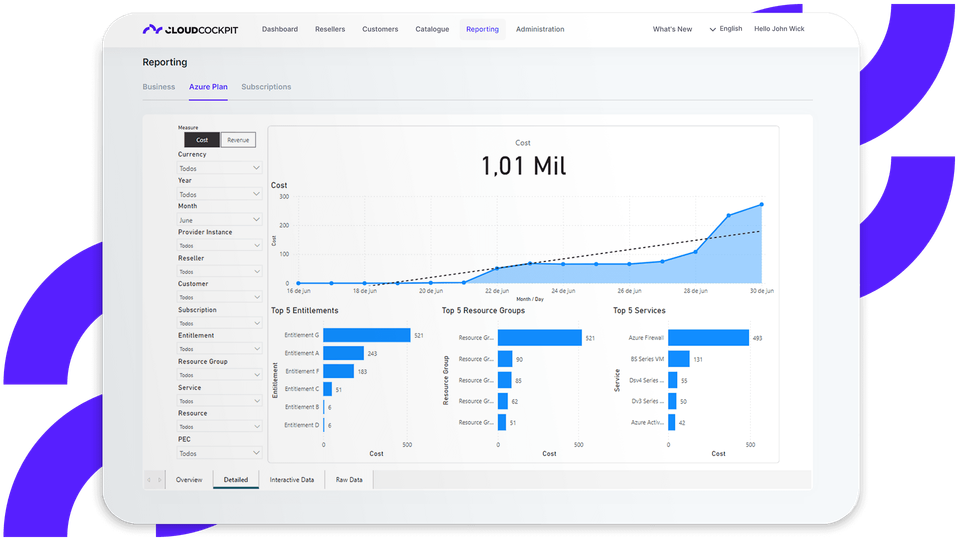This is the second post in our four-part series on risk management for Microsoft CSP resellers and distributors. Today we’re focusing on operational risk, those day-to-day breakdowns that disrupt service, hurt revenue, and damage trust.
Part I - Managing Financial Risk in the Microsoft CSP Program
Introduction: Operational Risk – The Silent Threat
Not all risks make headlines. Operational risks often show up quietly, in the form of billing errors, missed renewals, delayed provisioning, or inconsistent support. But over time, these "small" issues can become a major liability.
In the context of a CSP model, where you're constantly managing customer provisioning, licensing, support, and monthly billing, even small process failures can have damaging repercussions. Imagine a delayed license update leading to a customer outage or a missed Azure overage going unpaid.
The good news? Operational risks are highly preventable, if you’re intentional about structure and tools.
In the cloud reseller world, operational erros quickly translate to financial loss or unhappy customers. Some examples of operational risks include:
Billing and provisioning errors:
Perhaps you forgot to bill a customer for some extra licenses they added mid-term, or a manual invoice entry had a typo that undercharged them. These kinds of mistakes lead to revenue leakage.
Companies experience revenue losses, often, due to process errors in billing and tracking usage. Eventually, that translates to lost revenue and thinner profit margins.
Process bottlenecks or single points of failure:
If only one person in your company understands the intricacies of the Microsoft Partner Center or your billing system, you face a significant risk. If this key individual is unavailable (on leave or has left), your operations could be severely disrupted, leading to delays in new orders and overlooked renewals.
The absence of knowledge redundancy is a vulnerability that can impact your business operations. In the same vein, excessive manual steps increase the risk that a forgotten task, like a license renewal, could escalate into a major issue, such as a customer's service being cut off.
Service downtime or integration issues:
As an indirect provider managing a cloud marketplace, any disruption to your provisioning system risks delaying the delivery of services that end customers have paid for.
The same principle applies even if your role is that of a reseller using Microsoft's portals and APIs. Your ability to quickly identify and fix these problems is essential for operational continuity.
Not keeping up with program changes:
Given the continuous evolution of Microsoft's cloud, CSPs must adapt to changes such as the New Commerce Experience (NCE) licensing model, new product offerings, and updated requirements.
Failure to adapt your processes (for example, forgetting that an NCE license auto-renews unless canceled within 7 days of term end) could lead to customer confusion or subsequent financial adjustments.
A component of operational risk is the failure to incorporate the most up-to-date information and procedures into your business practices.
How to Mitigate Operational Risk:
The key is to streamline processes through automation, documentation, and proactive management:
Automate wherever feasible:
Manual processes are both susceptible to errors and challenging to scale. A strategic investment in a CSP management platform or billing automation tool can streamline provisioning and invoicing processes.
An integrated system such as CloudCockpit or another CSP automation solution, for example, can significantly reduce common errors by automatically synchronizing license changes and usage with billing.
Implement reconciliation and checks:
Even with automated systems in place, trust but verify. Implement a regular process to reconcile Microsoft's billing records with your customer invoices.
Early detection of discrepancies (such as a service you forgot to mark up or an unallocated Azure subscription) allows for timely correction, preventing losses or customer disputes.
Monitor operational metrics:
Manage your internal operations with the same diligence you apply to a production environment. Monitor KPIs such as: Were all customer orders provisioned within X hours? Is every license renewal confirmed in advance? What is the average lifespan of support tickets? Monitoring these metrics can highlight bottlenecks.
For example, if you find that change requests take a week to process, you might uncover an internal approval step that needs improvement. Many CSP platforms offer dashboards or reports for operational status.
Microsoft Partner Center itself provides an Activity log for customer actions, reviewing these logs can help ensure nothing occurred without your awareness.
Have a backup plan for key roles:
Avoid making your business reliant on just one or two individuals for essential tasks. Cross-train team members so that at least two people are proficient in every critical operation (provisioning, billing, support procedures, etc.).
Document procedures clearly so that if someone is out, another team member can follow the guide and maintain operations. Business continuity extends beyond IT systems to include people and processes as well.
Stay on top of Microsoft notifications and updates:
Key information from Microsoft, including security alerts and updates to pricing or program rules, is often shared through Partner Center announcements or emails.
Make sure someone on your team is tasked with the rapid receipt and processing of Microsoft notifications. Consider, for instance, if Microsoft or even platforms like CloudCockpit flag a fraudulent subscription or a new mandatory policy, a rapid response is crucial (such as suspending a subscription or implementing a new requirement).
Set up email alerts or designate a "CloudCockpit admin of the week" to check notifications daily. This helps prevent operational surprises.
Leverage platform features for efficiency:
If you utilize a CSP management portal such as CloudCockpit, Cloudmore and so on, leverage its operational efficiency tools. These platforms often provide centralized customer management (eliminating the need to log in and out of numerous tenants) and self-service portals for your customers.
Allowing customers to perform simple tasks (like adding a user or changing a password) through a controlled self-service portal can lessen the support burden on your team and provide customers with immediate satisfaction.
A beneficial situation that lowers operational stress.
Run drills or audits on your processes:
It can be beneficial to periodically "audit" your own CSP operations. For instance, select a sample customer and trace their journey: was their last order handled flawlessly? Did their last invoice align with Microsoft's charges plus your margin? Are their licenses compliant?
This kind of internal review can identify weaknesses (for example, you might find a subscription that wasn't properly added to the agreement). Addressing these issues proactively helps avoid larger problems in the future.
Strong operational practices
The benefit is a reduction in emergencies and firefighting, freeing up more time for business growth rather than fixing mistakes.
In addition, efficient operations often result in happier customers (they receive what they need on schedule, with fewer billing disagreements), which subsequently enhances your profitability and mitigates the credibility risks we'll discuss later.
Conclusion: Efficiency Is the Best Defense
Operational risk isn’t about drama, it’s about friction and friction slows growth.
When your processes are streamlined, automated, and well-documented, you can deliver a smooth customer experience and scale without chaos. That’s the heart of operational maturity.
Up next in Part 3: we’ll talk about Credibility Risk and how to protect the most valuable asset you have: your reputation.
Stay tuned!


